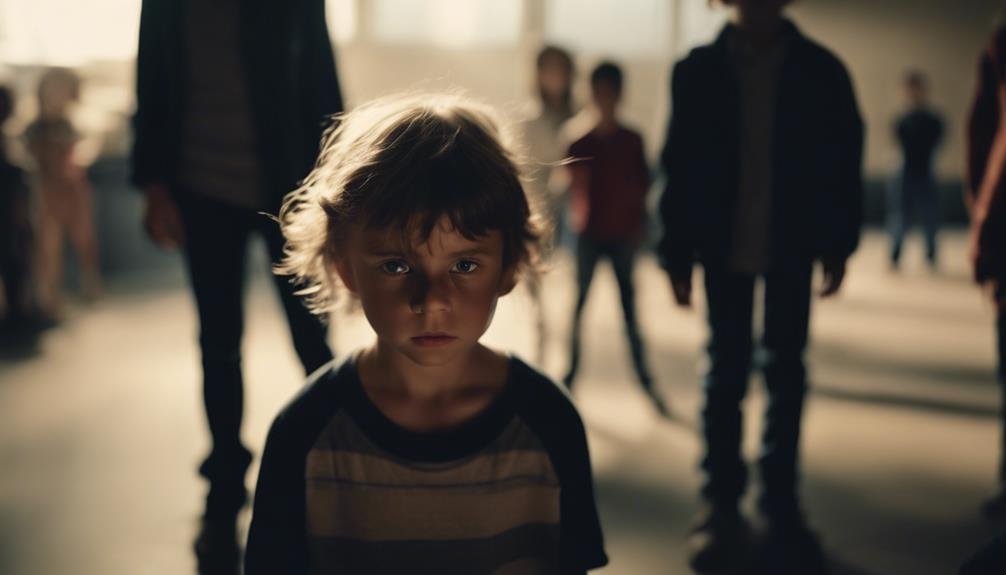When children witness domestic violence, it can deeply affect their behavior. The exposure to such violence can trigger emotional responses that lead to behavioral changes. This experience impacts their cognitive development, potentially causing delays. Children may struggle with regulating their emotions and showing challenging behaviors. Additionally, it can create social and psychological challenges, hindering their healthy development. This is why intervention and support for these children are essential. Understanding the full extent of these effects will give you insight into how important it is to address the impact of domestic violence on children.
Key Takeaways
- Witnessing domestic violence triggers aggressive behaviors in children.
- Exposure to violence hinders cognitive development, causing delays.
- Trauma and stress from violence lead to increased anxiety and social withdrawal.
- Emotional distress affects emotional regulation, resulting in challenging behaviors.
- Domestic violence disrupts normal development, impacting children’s behavior.
Impact of Witnessing Domestic Violence
Witnessing domestic violence can have a significant impact on children’s behavior and mental well-being. Children exposed to domestic violence are at a heightened risk of developing mental health problems like anxiety and post-traumatic stress disorder. The effects of domestic violence can be far-reaching, with exposure impacting brain development and leading to behavioral issues in adolescents.
Shockingly, statistics from 2010 revealed that 1 in 15 children were exposed to cases of intimate partner violence, highlighting the prevalence of this issue.
The impact of witnessing domestic violence goes beyond emotional distress; these children are also at risk of accidental harm and may require health assessments due to the volatile environment they’re exposed to. It’s important to recognize the detrimental effects that exposure to violence can have on children and provide them with the necessary support and resources to navigate these challenges.
Behavioral Changes in Children
Children frequently display a range of behavioral changes when exposed to domestic violence, reflecting the profound impact of such experiences on their emotional and psychological well-being.
Witnessing domestic violence can trigger aggressive behaviors in children, such as acting out, defiance, and even violence towards others. The stress and trauma of living in a violent environment may lead to increased levels of anxiety and social withdrawal.
These behavioral changes can manifest as difficulties in regulating emotions, leading to outbursts and challenging behaviors. Additionally, children exposed to domestic violence may struggle to feel safe and secure, resulting in behaviors like withdrawal, clinginess, or hypervigilance.
It’s important to understand that these behavioral changes are often coping mechanisms for children trying to navigate the complex and distressing dynamics of domestic violence. By recognizing and addressing these behaviors with empathy and support, we can help children heal and thrive despite their traumatic experiences.
Emotional Consequences of Exposure
When children are exposed to domestic violence, it can deeply impact their relationships, leading to trust issues and difficulties forming healthy connections.
These emotional consequences often manifest in observable behavioral changes, such as withdrawal, aggression, or emotional outbursts.
To cope with the trauma they’ve experienced, children may develop various mechanisms to navigate their challenging emotions and interactions.
Impact on Relationships
The emotional aftermath of exposure to domestic violence can profoundly impact how children navigate and form relationships as they grow. Children who witness domestic violence may struggle with developing healthy attachment styles, leading to trust issues and difficulties connecting with others.
The emotional trauma experienced in such situations can hinder children’s ability to express their emotions effectively, making it challenging for them to form secure bonds with peers and caregivers. Fear, anxiety, and avoidance may manifest in their relationships, stemming from the distress caused by witnessing domestic violence.
These children might also adopt maladaptive coping mechanisms as a way to deal with the emotional turmoil they experience, which can further complicate their interactions with others.
Understanding the impact of exposure to domestic violence on children’s relationships is essential in providing the support and guidance needed to help them overcome these challenges and build healthy, fulfilling connections in the future.
Behavioral Changes Observed
Exposure to domestic violence can profoundly impact children’s emotional well-being, leading to observable behavioral changes as a consequence of their traumatic experiences.
When children witness domestic violence, they may exhibit a range of behavioral changes, including increased aggression, withdrawal from social interactions, and acting out behaviors. These behaviors are often manifestations of the emotional consequences they face, such as anxiety, fear, and post-traumatic stress disorder.
The impact of witnessing domestic violence can also be seen in how children struggle with emotional regulation, resulting in mood swings, outbursts, and difficulty coping with stress.
Children exposed to domestic violence may display symptoms of trauma, like nightmares, flashbacks, and hypervigilance, which further contribute to their behavioral changes. These emotional consequences can lead to depression, low self-esteem, and challenges in forming healthy relationships.
Understanding and addressing these behavioral changes are essential in providing support and intervention to help children navigate the effects of witnessing domestic violence and promote their emotional well-being.
Coping Mechanisms Developed
Children exposed to domestic violence often develop coping mechanisms as a way to navigate the emotional consequences of their traumatic experiences. These coping strategies, such as hypervigilance, denial, or dissociation, can help children temporarily deal with the overwhelming feelings associated with witnessing violence at home.
However, these mechanisms may lead to emotional numbness, difficulties in expressing emotions, and challenges in forming healthy relationships in the long term. The emotional consequences of exposure to domestic violence, including feelings of guilt, shame, fear, and a lack of trust in others, can manifest in symptoms of anxiety, depression, and post-traumatic stress disorder in children.
It’s essential to recognize that the coping mechanisms developed by these children can profoundly impact their emotional regulation, self-esteem, and ability to handle stress as they grow older. By understanding and addressing these coping mechanisms early on, caregivers and professionals can provide the necessary support to help children heal and thrive despite their traumatic experiences.
Cognitive Development Effects
Experiencing domestic violence can have profound effects on children’s cognitive development, impacting their ability to learn and regulate their emotions effectively.
Witnessing violence at home may lead to cognitive delays, hindering academic performance and intellectual growth.
The stress and trauma from exposure to domestic violence can create challenges in memory, attention, and problem-solving skills for children, affecting their overall cognitive functioning.
Impact on Learning
Amidst the tumultuous environment of domestic violence, children may find their cognitive development greatly impacted, hindering their ability to learn and thrive academically.
Exposure to domestic violence can lead to emotional distress, affecting problem-solving skills, memory, and concentration. The trauma experienced in such situations can create barriers to academic success, impeding children’s ability to reach their full potential.
This emotional turmoil can result in difficulties with decision-making and critical thinking, further impacting their learning capabilities. The chaotic and unstable nature of living in an environment plagued by domestic violence can greatly interfere with a child’s cognitive abilities, hindering their educational progress.
It’s essential to recognize these challenges and provide support to help children overcome the obstacles posed by the trauma they’ve endured, fostering an environment where they can learn and grow effectively.
Emotional Regulation Challenges
Managing the aftermath of domestic violence, the emotional regulation challenges faced by children can greatly impact their cognitive development, presenting hurdles in various aspects of their academic journey. When children are exposed to domestic violence, their ability to regulate emotions may be compromised, affecting their cognitive processes.
This struggle with emotional regulation can manifest in difficulties with focusing, problem-solving, and decision-making, hindering their academic performance. Witnessing violence can impede the development of healthy coping mechanisms, leaving children vulnerable to impulsive or aggressive behaviors as a means of expressing their emotions.
It is important to recognize that these emotional regulation challenges stem from the traumatic experiences of domestic violence and require empathy and support to address effectively. By providing a safe and nurturing environment, promoting emotional awareness, and teaching healthy coping strategies, caregivers and educators can help children develop the necessary skills to navigate their emotions and enhance their cognitive development despite the adversities they’ve faced.
Social Interaction Challenges

Children exposed to domestic violence often face significant social interaction challenges, impacting their ability to form healthy relationships and engage with peers. Witnessing violence in the home can instill fear, anxiety, and deep-seated trust issues in children, making it difficult for them to interact with others. This can lead to behaviors such as aggression or social withdrawal, as the trauma they experience affects their ability to trust and connect with their peers.
As a result of these challenges, children may struggle in social settings, experiencing social isolation and finding it hard to communicate effectively or make friends. These difficulties can extend to the school environment, where they may face obstacles in participating in group activities or forming meaningful relationships with classmates.
It’s essential for caregivers, teachers, and mental health professionals to provide support and guidance to help these children navigate their social interaction challenges and develop healthy social skills despite their exposure to domestic violence.
Maladaptive Behavior Patterns
Children who witness domestic violence often develop maladaptive behavior patterns as a way to cope with the trauma they experience. These behaviors can manifest as aggression, defiance, emotional dysregulation, and withdrawal.
Witnessing violence at home disrupts their ability to regulate emotions, impacting their relationships and overall well-being.
Impact on Relationships
Exposure to domestic violence can greatly impact how individuals develop maladaptive behavior patterns in their relationships, often mirroring the aggression and conflict they witness. Children who witness domestic violence may internalize unhealthy dynamics, affecting their ability to establish secure and trusting relationships.
These experiences can normalize aggressive behaviors and ineffective conflict resolution strategies, which children may later replicate in their own relationships. Setting boundaries and expressing emotions can become challenging for those affected by domestic violence, hindering their ability to navigate relationships effectively.
Distorted perceptions of healthy relationships stemming from witnessing violence may lead to difficulties in forming positive and supportive connections. Understanding the impact of domestic violence on relationship development is essential in providing support and interventions to break the cycle of maladaptive behavior patterns.
Emotional Regulation Challenges
Developing healthy emotional regulation skills is essential for individuals who’ve experienced domestic violence, as chronic stress and trauma can greatly impact their ability to manage emotions effectively.
Children exposed to domestic violence often face emotional regulation challenges, leading to maladaptive behavior patterns that hinder their social interactions. The constant exposure to violence can disrupt their ability to cope with emotions, resulting in emotional dysregulation that manifests as aggression, anxiety, and other behavioral issues. These children may struggle to control their emotions, affecting their behavior and interactions with others.
It is vital to understand that children experiencing domestic violence need support and guidance to develop appropriate emotional regulation skills. By recognizing the impact of chronic stress on their emotional well-being and addressing maladaptive behavior patterns early on, caregivers and professionals can help these children build healthy coping mechanisms.
Through intervention and therapeutic support, it’s possible to assist these children in managing their emotions and improving their social interactions.
Coping Mechanisms Disruption
Managing the aftermath of domestic violence can disrupt coping mechanisms, leading to maladaptive behavior patterns that impact emotional regulation in children. When children are exposed to trauma, such as witnessing domestic violence, their usual ways of coping may become overwhelmed.
This disruption can result in maladaptive behaviors like aggression or withdrawal, as children struggle to process the stress and fear they’ve experienced. The trauma of domestic violence can make it challenging for children to regulate their emotions and responses to stress, leading to behavior alterations that can persist into adulthood.
It is important to recognize that these maladaptive behavior patterns are often a direct result of the coping mechanisms being disrupted by the trauma of domestic violence. By understanding the impact of such experiences on children, we can better support them in developing healthier coping strategies and restoring their emotional regulation.
Through intervention and support, children can learn to navigate their emotions and responses in a more adaptive way, overcoming the challenges posed by the disruption of their coping mechanisms.
Psychological Distress in Children
Children who witness domestic violence often experience significant psychological distress, manifesting in various detrimental outcomes. This distress can present itself through trauma symptoms, post-traumatic stress disorder, declined educational performance, behavioral issues, and negative emotions.
Research indicates that exposure to domestic violence can lead to long-term psychological consequences in children, affecting their overall well-being and development. Trauma symptoms such as anxiety, depression, and hypervigilance are common in children who witness domestic violence regularly. These experiences can culminate in the development of post-traumatic stress disorder, impacting the child’s ability to function in daily life.
Additionally, the psychological distress stemming from domestic violence can result in behavioral issues like aggression, defiance, and difficulties forming healthy relationships with peers. It is important to recognize the profound effects of psychological distress on children exposed to domestic violence.
Need for Intervention and Support
Recognizing the profound impact of domestic violence on children’s psychological well-being, it’s imperative to address the urgent need for intervention and support to help them navigate through the emotional challenges they face.
Children exposed to domestic violence often endure trauma that manifests in behavioral changes like aggression and anxiety. Interventions and support systems play a critical role in assisting these children in coping with the emotional and psychological aftermath of witnessing such violence.
Early intervention by trained professionals is key to mitigating the long-term effects on their behavior and mental health. Creating a safe and nurturing environment, coupled with therapy and counseling, can aid in their recovery and the development of healthy coping mechanisms.
Disruption of Normal Development

Experiencing domestic violence can greatly disrupt the normal development of children, impacting various aspects of their emotional and social growth. Children who are victims of domestic violence often face significant challenges that can alter their behavior and emotional well-being.
Witnessing or being directly involved in domestic violence can subject children to trauma, fear, and instability, hindering their ability to develop in a healthy manner. This disruption in normal development can manifest in various ways, such as emotional and behavioral issues, difficulties in forming relationships, and impaired social interactions.
The chronic exposure to violence can lead to disrupted attachment patterns and negatively impact a child’s brain development and coping mechanisms. The unpredictable and violent nature of domestic abuse can instill a sense of fear, hypervigilance, and heightened stress responses in children, potentially leading to maladaptive behaviors.
Understanding the significant impact of domestic violence on a child’s development is essential in providing effective support and intervention to help them overcome these adversities.
Effects on Emotional Regulation
Witnessing domestic violence can greatly impact children’s emotional regulation, leading to challenges in managing and expressing their feelings effectively.
Children exposed to domestic violence may struggle with regulating their emotions, experiencing heightened emotional reactivity and intense feelings more frequently. The exposure to domestic violence can result in difficulties in self-soothing and coping with emotions like anger, fear, or sadness. This disrupted emotional regulation can manifest in their behavior, affecting how they interact with others and respond to different situations.
The impact of domestic violence on children’s emotional regulation is significant, as it hinders the development of healthy coping mechanisms and emotional expression. These challenges in regulating emotions can have long-lasting effects on children’s behavior and overall well-being.
Understanding and addressing these emotional struggles are vital in providing support and intervention for children who’ve been exposed to domestic violence, helping them navigate their emotions and behaviors in a healthy way.
Frequently Asked Questions
How Can Abuse Affect a Childs Behaviour?
Abuse can deeply impact a child’s emotional responses, social interactions, academic performance, mental health, coping mechanisms, and self-esteem. Witnessing violence can cause behavioral changes and psychological issues, affecting various aspects of a child’s life.
How Violence Affects Children’s Development?
When violence impacts children, it disrupts emotional regulation, cognitive growth, social interactions, academic success. Trauma responses can lead to struggles. Finding healthy coping mechanisms is essential for aiding in development and healing from such experiences.
What Does Violence Do to a Child’s Brain?
In children exposed to violence, the brain’s development is hindered, affecting emotional regulation, cognitive functioning, and social skills. Traumatic memories disrupt normal growth, leading to behavioral changes. Your brain copes, but scars remain.
What Type of Effects Does Abuse Have on a Child Person?
Experiencing abuse can have lasting effects on a child person. Emotional trauma can lead to behavioral changes, trust issues, and impact self-esteem. It may also affect social skills and academic performance, creating challenges in various aspects of life.
Conclusion
As you reflect on the impact of domestic violence on children’s behavior, you can’t help but wonder: how can we provide the support and intervention these children desperately need?
Witnessing domestic violence can lead to emotional distress, cognitive challenges, and social difficulties. It’s essential for us to recognize the signs, offer help, and create a safe environment for these children to thrive.
Let’s work together to break the cycle and secure a brighter future for all.






